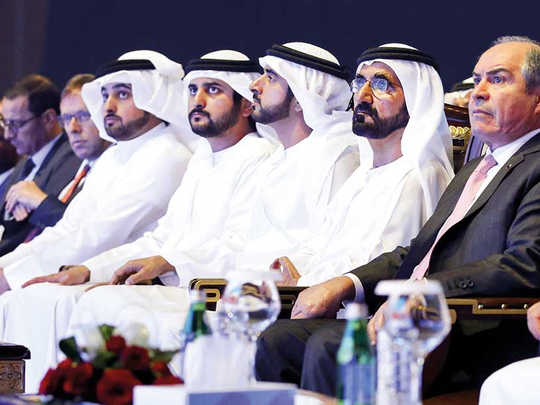
Dubai: Knowledge will be the key tool in helping adapt to a rapidly changing digital world, speakers at the opening ceremony of the fourth Knowledge Summit on Monday said.
The summit was inaugurated by His Highness Shaikh Mohammad Bin Rashid Al Maktoum, Vice-President and Prime Minister of the UAE and Ruler of Dubai, who was accompanied by Shaikh Hamdan Bin Mohammad Bin Rashid Al Maktoum, Crown Prince of Dubai, and Shaikh Ahmad Bin Mohammad Bin Rashid Al Maktoum.
Speaking to guests on the first day of the summit, Hani Al Mulki, Prime Minister of Hashemite kingdom of Jordan, the guest of honour, told the audience that the Arab world must continue to embrace technological advancements brought about by the fourth Industrial Revolution.
“The digital revolution is a competitive and collaborative campaign between man and machine,” he said.
Al Mulki referred to the revolution as one that will have an inevitable impact on every country in the world and described it as an opportunity for all nations to develop their knowledge and expertise in order to focus on human development, technological changes and sustainability.
“The question is, are we ready to absorb [the impact] and use it for the development of our countries?,” he asked the audience.
Referring to digital and technological developments such as the use of drones, autonomous cars and 3D printers, Al Mulki informed that the main aim of the digital revolution is to empower humans.
“This revolution is not taking place to empower machinery, but to collaborate with people in order to empower them and to result in higher levels of productivity, and less pressure on natural resources — and accordingly, a better living standard for everyone,” he added.
Al Mulki also emphasised the need to focus on developing education in the Arab world, referring to a number of global initiatives launched by Shaikh Mohammad, as an incentivce to get ahead onthe road to success.
“Education is the true indicator of a country’s progress and success in addressing the fourth industrial revolution… In the Arab world, the real revolution is the human being,” he said.
Discussing the future of the region, Al Mulki said it will witness an increase in education and decrease in unemployment rate as it embraces the digital revolution.
“We will witness smart projects, digital marketing projects, flying cars, driverless cars, and a world without diseases and illnesses,” he said.
Al Mulki also spoke of the need to empower Arab youth, who he described as “thirsty for modernism” with technological skills. He pointed out that while job requirements in the near future will differ from that in the traditional job market, the new generations must be prepared to take on the challenges.
“The economic, social and human structure must be developed,” he added.
Global Knowledge Index
Meanwhile, the Mohammad Bin Rashid Al Maktoum Knowledge Foundation (MBRF) announced the four countries ranking highest in the Global Knowledge Index in a short video, placing Switzerland in first place, followed up by Singapore, Finland, and the Netherlands.
‘The Global Knowledge Index’, reports findings from 131 countries over six segments including information communication technology (ICT,) research devotement and innovation, economy, pre-university education, technical education and training, and higher education.
The fourth edition of the summit, under the theme ‘Knowledge and the Fourth Industrial Revolution,’ is studying the impact of the Fourth Industrial Revolution on different sectors as it continues to redraw all aspects of life for individuals, institutions and nations.
Topics being discussed during the two-day summit include ‘Knowledge Cities’, which are the cities of the future; data availability challenges in the Arab region; the challenges and opportunities facing the education sector in the Arab world; the 4IR and higher education.











